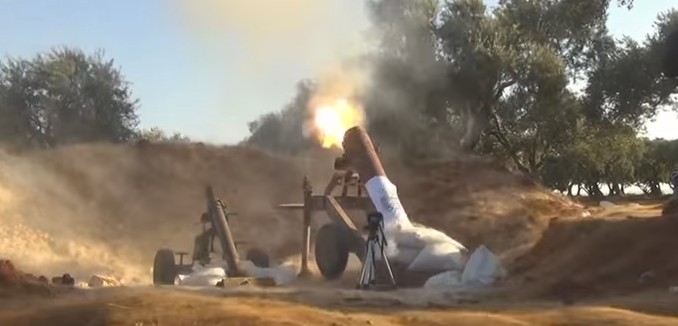A “mini world war” has broken out in the battle over the northern Syrian city of Aleppo, where an array of proxy forces are vying for power, The Washington Post reported on Sunday.
Russian warplanes are bombing from the sky. Iraqi and Lebanese militias aided by Iranian advisers are advancing on the ground. An assortment of Syrian rebels backed by the United States, Turkey, Saudi Arabia and Qatar are fighting to hold them back. Kurdish forces allied both to Washington and Moscow are taking advantage of the chaos to extend Kurdish territories. The Islamic State has snatched a couple of small villages, while all the focus was on the other groups.
Ahead of a supposed pause in the hostilities negotiated by world powers and due to be implemented later in the week, the conflict seems only to be escalating. Turkey joined in over the weekend, firing artillery across its border at Kurdish positions for a second day Sunday and prompting appeals from the Obama administration to both Turks and Kurds to back down.
Residents of the areas around Aleppo say that Russian airstrikes have intensified following last week’s announcement of a partial cessation of hostilities to take effect this week.
The battle for the city could deal a significant blow to the Syrian rebels who launched their revolt against the regime of President Bashar al-Assad five years ago. According to the Post, a victory in Aleppo would also be a boon for Assad’s backers. For Russia, it would be a sign that Moscow was now the “dominant regional power” in the Middle East. For Iran, which backs Hezbollah and the Iraqi Shia militias that have been making significant advances on the ground, a victory would mean “extending the sway of Iran far beyond the traditional Shiite axis of influence into Sunni areas of northern Syria.”
Emile Hokayem of the International Institute for Strategic Studies told the Post that Assad’s forces and their backers are forcing residents to flee areas in order to secure them. “They’re depopulating areas of people whose loyalties are impossible to recover,” said Hokayem. “It’s a much cheaper and easier way to occupy territory than by trying to win hearts and minds. They’re simply going to push people out so that there is no insurgency.”
U.S.-backed Kurdish forces are also taking advantage of the chaos by expanding their presence along the Syrian border with Turkey, leading to friction between Ankara and Washington.
The People’s Protection Units, or YPG, has been moving eastward to link two Syrian Kurdish enclaves into a single territory, which would cover more than half of Syria’s border with Turkey. This maneuver is strongly opposed by Turkey, which considers the YPG to be an affiliate of the PKK, a Turkish Kurdish organization designated as a terrorist group by both Ankara and Washington. The U.S. disagrees with this assessment, and has in fact been working with the YPG against the Islamic State.
An editorial in the Post on Friday observed that the agreement Secretary of State John Kerry struck with Russia to implement a temporary cessation of hostilities in a week’s time offers Assad and his backers the opportunity to defeat the anti-Assad rebels:
The salient feature of the agreement struck by Secretary of State John F. Kerry is a partial cessation of hostilities — a week from now. That will allow Russian planes to continue an aerial campaign that, as documented by human rights groups, has included dropping cluster munitions on civilian areas. It could allow Shiite fighters from Lebanon and elsewhere, commanded by Iran, to cut off the last supply route to the half of Aleppo held by U.S.-supplied rebel forces. That would put Moscow and its allies closer to their principal goal — which is to eliminate any forces in Syria other than the Assad regime and the Islamic State. If they don’t succeed in a week, Russia has given itself leave to continue bombing “terrorist” groups, which it defines as including the rebels in Aleppo.
[Photo: Qasion News Agency EN / YouTube ]




